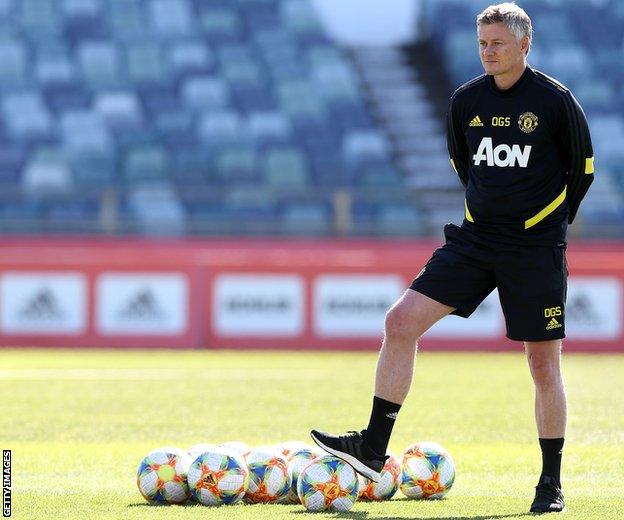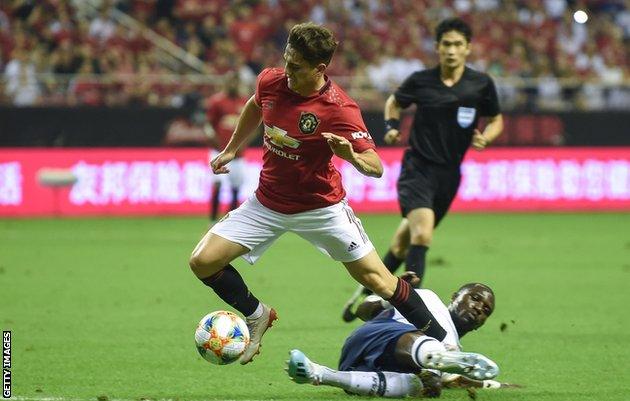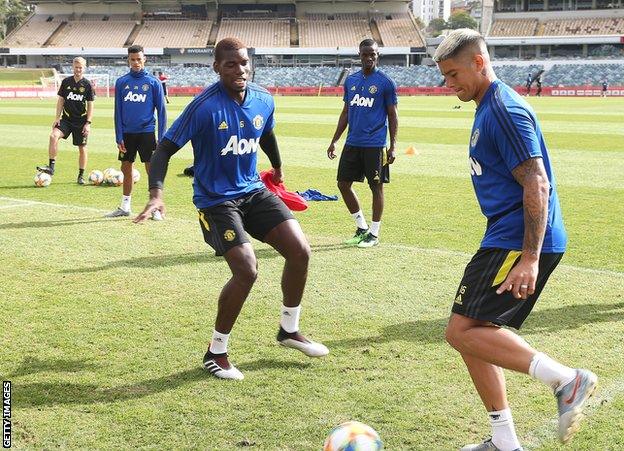Man Utd: Has strategy changed and is Ole Gunnar Solskjaer the driving force?
- Published
- comments

On Tuesday, Ole Gunnar Solskjaer returns to Norway with his Manchester United team for the first time, for a friendly match against his home town team Kristiansund in Oslo.
With less than two weeks until the Premier League season starts - and only two friendlies remaining - Solskjaer has yet to make any big-name signings, a significant departure from the approach of his predecessors.
Also absent have been avoidable headlines and controversies. Instead, the 46-year-old has gone about his work in a quiet, understated way, completely at odds with the tenures of Jose Mourinho and Louis van Gaal. The status of those two men within the game ensured United were box office, even if the actual team were not.
So, have United really changed their strategy - and, if so, is Solskjaer at the heart of it?
No big names for the sake of it
When Zinedine Zidane seemingly sounded the death knell for Gareth Bale's Real Madrid career, it was informative how quickly word came out of United that they would not be in the market for the Welshman.
Bale to United stories have been a staple part of every summer transfer window since before he left Tottenham for Real Madrid in 2013. It is not that Solskjaer is against signing big names but they have to fit his preferred way of playing. Angel di Maria, Henrikh Mkhitaryan and, more recently, Alexis Sanchez have all been bought despite, seemingly, their style being at odds with the manager's philosophy.
Big money has been spent on others - Memphis Depay, Radamel Falcao, Morgan Schneiderlin, Bastian Schweinsteiger and current squad member Fred - all of whom lacked either the fitness, ability or application for the task in front of them.
Solskjaer wants a squad of younger, motivated players - very much in keeping with how Sir Alex Ferguson managed. As was the case with Mourinho and Van Gaal, he will choose his targets in conjunction with the recruitment department. It will then be up to executive vice-chairman Ed Woodward and head of corporate development Matt Judge to do the deals.

Solskjaer is keen to bring young talent through into his Manchester United squad
Mourinho and Woodward ended up at loggerheads this time last year, when the former wanted to sell Anthony Martial and buy a central defender and the latter blocked the Frenchman's sale and then determined there was no attainable target better than the centre-backs United already had.
Over the past week, Nicky Butt has also had an upgrade to head of first-team development. The Treble-winning former United midfielder will work closely with Solskjaer to decide which players are capable of moving from the junior ranks to the senior. The former England midfielder will be responsible for steering each one through the transition.
Developing and recruiting the right players is one thing, getting rid of those he deems surplus to requirements is quite another. It remains to be seen whether the "baby-faced assassin" can cull stars in the brutal way his former boss did with such regularity, but there is evidence he can use the carrot and stick approach to positive effect.
It is understood Jesse Lingard was given a severe dressing down over a controversial summer social media post. Yet, rather than react badly, the England international has responded by putting in a series of outstanding performances in training.
Solskjaer has noted how 26-year-old Lingard finishes either top, or close to it, in many of the individual tasks. He has been willing to forgive, therefore, an indiscretion he puts down to the exuberance of youth, confident his harsh words will ensure it won't be repeated.
What will Solskjaer's Man Utd look like?
The Solskjaer-stikk: The wrestling move named after Ole's dad
Over the past five years it has not always been obvious how United intended to play.
Either the system changed, or personnel arrived who did not appear to fit a particular pattern. It was not scattergun but at times it did appear that signings, sometimes for big money, were made without sufficient thought being put into how they would fit the overall team shape.
United were supposed to be appointing a technical director to address these recruitment flaws, though that is still to happen.
Even without a role now in place at many of Europe's elite clubs, Solskjaer has his own clear idea of how he wants his team to play. Four at the back, two deep in midfield, three attacking in front of that and a centre-forward. Crucially, he wants them all to have pace and he wants players who can interchange.
New £15m signing Daniel James may be viewed, even by some at Old Trafford, as a bit of a gamble - but he fits Solskjaer's template. And on tour the Wales winger was a significant threat, though his final ball was not always up to scratch.

James arrived from Swansea on 12 June - Crystal Palace right-back Aaron Wan-Bissaka became United's second summer signing just over two weeks later
Eight times in four games James was sent flying by opponents not quick enough to stop him, and three of those instances involved Tottenham's Moussa Sissoko.
"Pre-season is not about results," said Solskjaer. "It is about finding a style that suits the players. We've made good strides towards becoming the team we want to be."
It was informative also to see how Marcus Rashford and Martial interchanged positions.
Both were used as the main striker, as well as wide in the line of three in behind, and Solskjaer has been working to make them more of a goal threat.
Rashford's highest club tally for a season is 13. Martial's is 17 but that was in his 2015-16 debut campaign. Those figures need to rise. Romelu Lukaku, for all his obvious faults, has scored 27 and 15 in his two seasons with the Old Trafford club.
Tough training at the Waca
When United set off on their four-match tour of Australia and Asia on 7 July, there were more questions than answers surrounding Solskjaer and his team.
Some of the questions remain. Will Lukaku leave? Will Harry Maguire arrive from Leicester City? What is going to happen with Paul Pogba? Are United going to sign a new midfield player?
However, over the 20 days they were away, some aspects of Solskjaer's management became obvious; as well as the formation he prefers, there was his own work ethic and the demands placed on his players, as well as his trust in youth.
At the end of last season, when United's encouraging response to a change of manager gave way to a series of disappointing performances that culminated in an away draw at Huddersfield - who had taken four points from their previous 23 Premier League games - and a home defeat by already-relegated Cardiff, Solskjaer knew his squad were simply not fit enough for the front-foot style he wanted to implement.
United addressed that problem at the historic Waca cricket ground in Perth, which they used as their training base during an 11-day stay in Western Australia.

Training sessions have included extra high-intensity sessions this summer
Solskjaer scheduled 14 training sessions over 10 days. All but three were closed to the media but it was not unusual to see the famous floodlights shining across the eastern part of the city as United's players were put through their paces.
Virtually every player took part in every session. The one notable exception was Lukaku, who did not play a single minute in United's four tour games because of injury.
The sessions themselves could change and match days were lighter, as would be the case at virtually every club.
Interestingly though, high-intensity work rose by 50% on the previous summer. During the two games in Australia, against Perth Glory and Leeds United, total distance covered rose by 10%, although, in the heat and humidity of Singapore and Shanghai that fell slightly in matches against Inter Milan and Tottenham.
Although most certainly not a return to the old days of going on long runs to build up endurance, Solskjaer does place value on running and expects an element of this in most aspects of training, even during tactical drills.
There were more gym sessions and more preventative work on the hamstring and groin areas, in addition to a greater amount of core strengthening work.
This might be viewed as routine stuff. But Solskjaer felt he had to address the fitness of his squad as a matter of urgency. In his view, Mourinho had built it to counter attack, not to dominate and press as sides such as Manchester City, Liverpool and Tottenham do, and which he feels United's tradition demands.
By its nature, this requires greater fitness, allied, in theory, to better technical ability. It is no surprise City are one of the Premier League's most hard-working sides, in addition to the most skilful.
"We've been working on intensity and pressing," said Solskjaer. "We've got players who like to be on the front foot and we want that to continue."
The peace project
The one other aspect of this Manchester United pre-season that has fundamentally changed from the last is that club officials no longer need to be concerned about what the manager is going to say to the media.
It may not be much use for the journalists who travelled to cover their trip but Solskjaer does not do public confrontation. The Norwegian is very much a disciple of Tottenham counterpart Mauricio Pochettino who, after the two sides had played in Shanghai last week, told the press there was no point asking him about potential signings, or even those he might sell, because it was a club matter and any information would be released on the official website.
Neither will Solskjaer publicly criticise Woodward or even United's decision to organise a long overseas tour - in truth no manager likes them - because he views it as counter-productive.
None of this guarantees United will win matches, which is, in the end, how Solskjaer will be judged.
And, with just over a week left before the English transfer window closes, his squad is still not the one he wants.
Lukaku seems certain to leave. A new central defender - specifically Maguire - is the top target but there are alternatives, and one will surely come in.
Confidence has been expressed often that Pogba will remain at the club but if he did leave for Real Madrid or Juventus, the Frenchman would need replacing. Either way, further strengthening in midfield is possible.
Some senior squad men may go as Solskjaer intends to use younger players, such as striker Mason Greenwood, in the Europa League rather than pack his team with experienced ones who cannot get a game in the Premier League.
Whatever the eventual make-up of the squad, the Norwegian will have the final say: "There won't be any players here I don't want."
Of course, there remains a large degree of uncertainty over United and Solskjaer given how last season finished.
Given the reset United appear to have undergone, it will also be interesting to discover what targets Woodward - and by extension the Glazer family - will judge Solskjaer by. In every season the club has failed to qualify for the following season's Champions League, the manager who started it has lost their job at some point. If they miss out again this term, penalty clauses will cost them sponsorship money from Adidas.
Yet, unlike with Solskjaer's three predecessors, Woodward is acutely aware that if things go wrong again, it will not affect the Norwegian's status amongst the club's fans. If anything, it will shine a light even more sharply on how he is running the Old Trafford outfit.
There is no clear road ahead. It was suggested in a private conversation in Australia that if United started the season without further reinforcements, they would need good fortune at the start of the campaign in order to avoid major difficulties. As yet, and not for a lack of trying, additions are yet to be made.
However, 12 months after they approached a new campaign with the manager in conflict with the club, Old Trafford officials can at least be assured that this time around there is a unity of purpose between the man in charge of the team and the one in charge of the purse strings.